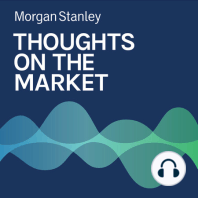3 min listen

Andrew Sheets: When Will High Inflation End?
Andrew Sheets: When Will High Inflation End?
ratings:
Length:
3 minutes
Released:
Jul 15, 2022
Format:
Podcast episode
Description
This week brought yet another reading of inflation that exceeded expectations, but if markets and central banks are able to think long-term, there may be some hope on the horizon.----- Transcript -----Welcome to Thoughts on the Market. I'm Andrew Sheets, chief cross-asset strategist for Morgan Stanley. Along with my colleagues, bringing you a variety of perspectives, I'll be talking about trends across the global investment landscape, and how we put those ideas together. It's Friday, July 15th at 4:00pm in London.One of the big stories this week was, once again, a high reading of US inflation that came in above economists’ expectations. If that sounds familiar, it’s because it is. US consumer price inflation was also higher than expected in June, May and April.These upside surprises to inflation create a trio of problems. First, investors will feel more confident if inflation starts coming down, and this is yet another month where that isn’t the case. Second, the Fed has been adamant that it will keep raising interest rates until inflation moderates, which means that more rate hikes are likely coming. And third, this sets up a real predicament; the Fed wants to bring inflation down, and sees this as key to its credibility, but raising rates today won’t do much for inflation over the short-term. That creates additional uncertainty.Markets are responding to that uncertainty by raising expectations of how much the Fed will increase rates in the near-term, while simultaneously becoming more worried about medium-term growth, and lowering expectation of rates over the long term. That has inverted the yield curve, something that, while rare, has historically signalled high odds of a recession.What’s notable, however, is that while there is intense focus on the concerns and negative surprises from the current rate of inflation, the longer-term picture is arguably getting better. One can observe expected rates of inflation over the next 5, 10 or 30 years, also called inflation break-evens. Those expectations have been falling rapidly over the last 2 months.In the US, markets currently see US Consumer Price Inflation to average about 2.35% over the next decade. That is more than half-a-percent lower than where that same estimate was just two months ago, and it’s similar to where these expectations were in March of 2021. 2.35% is also pretty close to the Fed’s inflation target; markets do not see inflation accelerating in an uncontrolled manner over the long term.For investors, think of this dynamic as one of short-term pain but longer-term gains. Near-term high inflation, and uncertainty of when it will decline, could keep the Fed cautious and argues against buying the dip.But looking further out, the market is giving encouraging signs that inflation is a manageable problem, and that central bank actions are working at addressing it. In the autumn, we could see a situation where the inflation data is moderating, while long-term inflation expectations confirm that that moderation continues. For markets, and for central banks, that would be much more helpful.Thanks for listening! Subscribe to Thoughts on the Market on Apple Podcasts, or wherever you listen, and leave us a review! We’d love to hear from you.
Released:
Jul 15, 2022
Format:
Podcast episode
Titles in the series (100)
Mike Wilson: 3 Summer Surprises Investors Could Be Missing by Thoughts on the Market